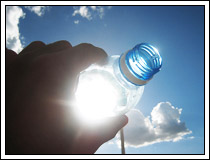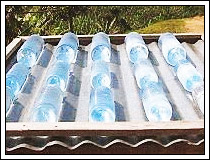Solar Water Disinfection
Popularly abbreviated as SODIS, solar water disinfection is a simple, safe, economical and effective method of disinfecting contaminated water. The method simply involves the use of sunlight and plastic PET bottles for purifying or improving the quality of drinking water.

Solar Water Disinfection – How it Works?
In the SODIS method, contaminated water is filled in PET bottles or glass bottles (made of heat-conducting material and preferably painted black) and exposed to direct sunlight for varying periods of time, usually for not less than 6 hours. During exposure, the UV-radiation (wavelength 320-400nm) of the sun raises the water temperature, thereby helping in inactivating/killing diarrhoea generating pathogens present in the water.
Factors Affecting Efficiency of SODIS
The following parameters affect the efficacy and consequently the safety of SODIS treated water:
- Geographic latitude of the place
- Altitude of the place
- Season
- Exposure period
- Time of the day
- Presence or absence of clouds
- Temperature
- Volume of the bottle or vessel containing the water
- Material of the bottle or vessel containing the water
- Water turbidity
- Water color.
Advantages of Solar Water Disinfection
A viable water treatment method, SODIS helps in improving the microbiological quality of drinking or cooking water.
The method can be easily applied at small communities of the world that do not have a centralized water treatment plant or access to other treatment or disinfection alternatives, such as filtration or chlorination.
 At household level, this decentralized water treatment method can be undertaken under the responsibility of the individual user. At household level, this decentralized water treatment method can be undertaken under the responsibility of the individual user.
The method is economical and has a low investment cost as it relies on locally available resources, plastic bottles, and sunlight.
Limitations or Disadvantages of Solar Water Disinfection
- SODIS does not have any effect on the chemical water quality.
- This water treatment method is not suitable for improving quality of large volumes of water.
- It does not help in increasing the water quantity or reducing water shortages.
- The method calls for relatively clear water, where turbidity is less than 30 NTU.
- The method is dependent on suitable climate and weather conditions, especially on places where convenient solar radiation exists. For instance, during days of continuous rainfall or cloudy days, this water treatment method does not perform satisfactorily.
|